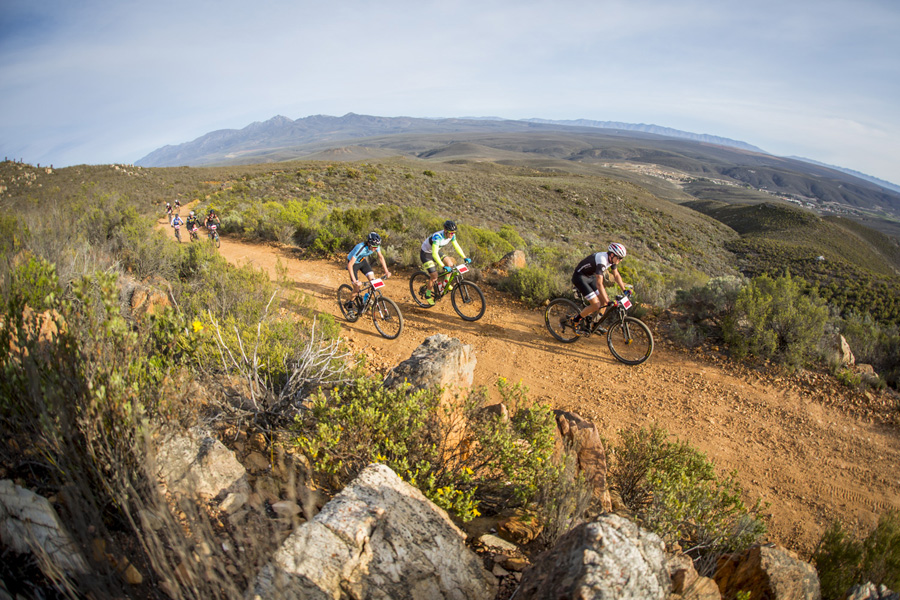There’s something magical about riding your mountain bike the 100km from Uniondale in the Karoo, to Knysna at the coast. There must be. A total of 4700 entered the 2017 edition of the BUCO Lions Karoo to Coast, which took place on Sunday 24 September.
Despite significant changes to mountain bike events over the past two decades the popularity of the Karoo to Coast, which first took place in 1999, remains high. With over 4500 entrants, it’s still one of South Africa’s biggest mountain bike events. Here are six reasons why.
By Sean Badenhorst
Photos: Ewald Sadie

It’s a point-to-point race
Say what you like, South Africans are inspired by a journey. ‘Start here and finish there’ strikes a chord with many. Sure, the logistics are challenging, but the actual experience is worth it. The Karoo to Coast logistics sees family and friends of around 60% of the field waking up around 04h00 to transport their entrants to Uniondale. From Knysna via George this is a 350km round trip (175km each way)!
According to event director, Zandile Meneses, around 40% of entrants stay overnight in Uniondale (either in the limited number of event tents or in local guesthouses, but the majority stay in Knysna…
Iconic South African point-to-point races that have stood the test of time include the Comrades Marathon and Dusi Canoe Marathon. In mountain biking, events like the TransBaviaans, the early Cape Epic, the Old Mutual joBerg2c, KAP Sani2c, The Munga and The Freedom Challenge, all have or continue to capture the spirit of journey. And of course, Karoo to Coast…

There is only one distance
Yes, 100km is a long way to ride a mountain bike. But that’s the challenge. The organisers of the Karoo to Coast have never added a half-distance event to try and capture a bigger field. They’ve kept to the original full distance and it’s forced participants to train more and reach the start in better condition. The first finishers complete the event in just over three hours and the last finishers take up to eight hours. We reckon the key to maintaining the popularity is keeping the event true to its original intention. There is no half-distance Comrades Marathon… If they added a half-distance start it wouldn’t be Karoo to Coast then would it?

It’s on gravel roads
Purist mountain bikers cringe at the thought of riding 100km on gravel roads. But the fact remains that this is very popular in South Africa and it’s a great way for people to get into mountain biking without fearing a painful fall on technical terrain. The tight turns on the Prince Alfred’s Pass are the only technical challenge on this route, but only at speed. Also, you can’t really enjoy the scenic nature of this event if you are focussed on a narrow piece of the singletrack ahead of you. With 1500 metres of ascent thrown in, it’s still a physical challenge – and when the wind blows, even more so…

It’s so incredibly scenic
It’s difficult to describe the beauty of the Karoo to Coast route. It passes through a number of ecosystems, which makes it incredibly varied in a relatively short distance. In 100km you go from dry, rocky semi-desert, then into natural grassy mountain top ground cover before heading into green fertile farmlands. All this before the start of the start of the Prince Alfred’s Pass. Then, as you descend this historic, twisty road you notice a change in the vegetation and geology. There is lush indigenous forest, fern groundcover and fynbos interspersed with agricultural land before spreading out into more thick indigenous forest and some forest plantations as you get closer to Knysna.
At 68km, it’s the longest publicly accessible mountain pass in the country. That’s right, sixty-eight kilometres! The pass itself descends 842 metres and there are more than 200 corners (most of them tight)… It was built by Thomas Bain – or actually designed by him, but built by his workforce (which comprised mostly convicts). The pass was officially opened on 29 September 1868. Next year it will celebrate its 150th anniversary (a good reason to enter, right?).

It’s usually on a long weekend
A large number of the Karoo to Coast entrants come from the Cape Town area. The 500-odd kilometre drive each way makes more sense over a long weekend. And Karoo to Coast is pretty much always around the 24 September Heritage Day public holiday date. In recent years, the three-day BUCO Dr Evil Classic mountain bike stage race in Plett has preceded Karoo to Coast, making for a bonus fourth day of riding for those with enough left in the tank to tackle the iconic South African race.

It’s for charity
The Karoo to Coast is staffed largely by volunteers from the Lions Club International. All proceeds from the event each year go to local community upliftment projects, making the event a fund-raising highlight for the region. It’s always good to know that your entry fee is going to help someone less fortunate. Because Lions Club is so established and has such a transparent way of implementing its fund allocation, you feel safe in the knowledge that the money goes where it’s most needed. Ride your bike on one of the most scenic race routes in the country and someone else in the region benefits. It’s a win-win and clearly a successful formula.
For the record, Robert Hobson won the 2017 men’s race and Jeanie de Villiers was the top woman. For full results and to find out more about the BUCO Lions Karoo to Coast, head over here http://www.karootocoast.com/index.html

All rights reserved


